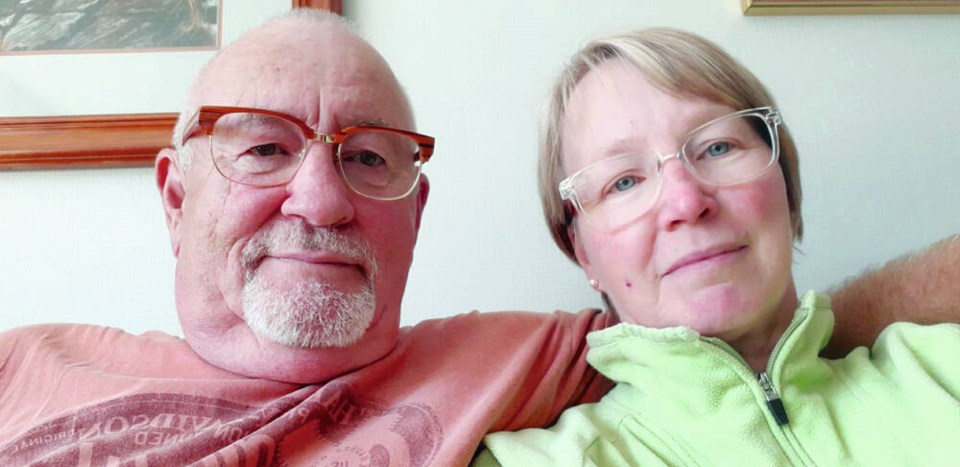When she was put on hold after calling 911, Stephanie Weir raced to the ambulance station two blocks from her Qualicum Beach home, but an attendant turned her away because the only ambulance was out on a call. It would be 30 minutes before an ambulance from nearby Parksville appeared.
“I arrived at the station, knocked on the door, informed the attendant my husband needs an ambulance only to be told it was out and there was only one,” said Weir. “I was shocked. The attendant at the door appeared irritated that I had the gall to interrupt him with my problem.”
It was 8 p.m. on Aug. 25 when Weir called 911 for the first time in her life. Her husband, Ian Weir, had just been released from hospital following prostate surgery.
A day after discharge, he was bent over in agony, only able to release drops of blood due to a blockage in his bladder. “Seriously if I had a gun that night I would have shot myself,” Ian said.
His wife called 911, but was shocked when she got a message telling her to hold. “I quickly hung up and dialed again to only receive the same message,” she said Wednesday. “I couldn’t believe it.
“Someone finally came on the line and informed me I was third in the queue.”
Weir was so confused that she asked the operator to explain what it meant to be in a queue for 911.
The Weirs, retired opticians, said their expectations of the system were shattered that night.
“I was beside myself,” said Weir. “I told the call taker I lived in Qualicum Beach, two blocks away from an ambulance station and I was walking there now.”
Weir credits the call taker for staying on the line as she ran to the station and back, all the while listening to the recorded B.C. Emergency Health Services message play in the background: “You have reached the B.C. Ambulance emergency line — a call taker will be with you shortly.”
The call taker apologized, saying the recording couldn’t be turned off. “It kept playing and playing,” Weir said. “I just couldn’t believe how long all of this was taking.”
After she was told there was no ambulance at the station, Weir hustled back home, where she was eventually put through to someone who took her information and said an ambulance would be there shortly. In all, it took 11 minutes to get through to the ambulance service and another 19 minutes for the ambulance to arrive.
The couple didn’t lodge a complaint because they figured their experience must have been an anomaly. They have now written their MLA.
“Having to call 911 is a traumatic experience, but being placed on hold takes it to another level,” said Weir, who contacted the Times Colonist after reading about Parksville resident Harry Charles Blakey in Wednesday’s edition.
The 72-year-old retired Mountie and lawyer died on his kitchen floor on Aug. 27, about 15 minutes into a 30-minute wait for an ambulance after his family called 911.
Blakey’s grown children and daughter-in-law, a nurse who tried to revive him, are calling on B.C. Emergency Health Services and the Health Ministry to act faster to improve ambulance response times.
Wife Nancy Blakey, a retired RCMP officer who held her husband as he died, said the story is not about individual paramedics or call takers but the system itself. “This in no way, shape, or form is about the staff of the B.C. ambulance service, because they are doing so much.”
Ian Weir, who is on the mend, said his experience with Parksville ambulance paramedics wasn’t good, but the doctors, nurses and other staff at Nanaimo Regional General Hospital were tremendous.
“We are truly grateful for these people and the job they do.”
A 911 operator who spoke to the Times Colonist on condition of anonymity said “the tragedy of the man dying while on hold to BCEHS is a daily occurrence.”
The 911 call takers, who are not medically trained, must stay on the line until the caller is patched through to the required service — fire, police or ambulance. Many callers don’t explain the nature of the emergency, and some 911 managers suggest not asking questions unless it’s a life-or-death situation, while other managers suggest operators use their discretion, she said.
There is a back line operators can use for situations such as childbirth, heart attack, stroke or a patient who is not breathing, she said. “I ask because I don’t want someone to die on me,” she said.
“This has been incredibly stressful — even more so than dealing with high-stress calls such as a shooting or a weapons call. And it’s constant. In a shift, you will easily take hundreds of 911 calls.”
Many call takers and dispatchers are on leave.
On Tuesday, Health Minister Adrian Dix said 24 rural ambulance stations will be converted to round-the-clock operations, up from 22 announced in July. He also revealed plans in July to fund 85 new full-time paramedics and 30 full-time dispatchers.
On Monday, BCEHS offered condolences to the Blakey family and said in a statement the ambulance service has been “put to the test this summer” but is making improvements.



